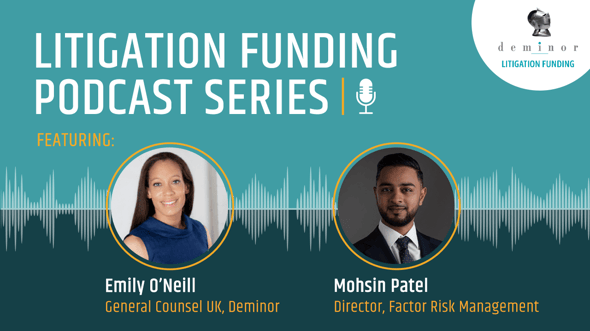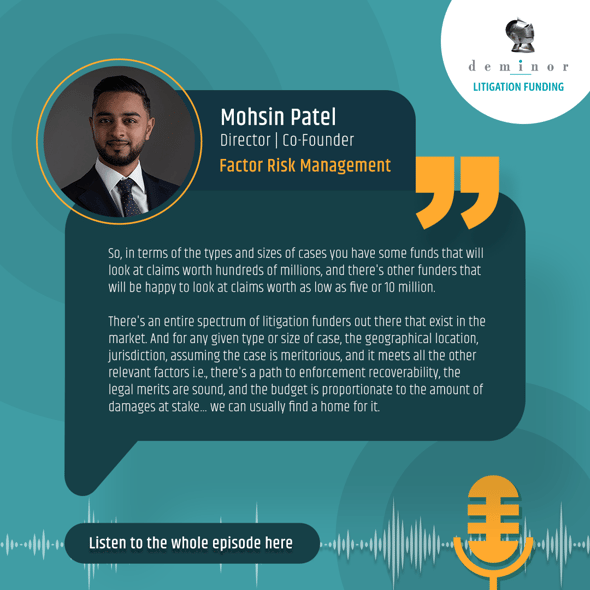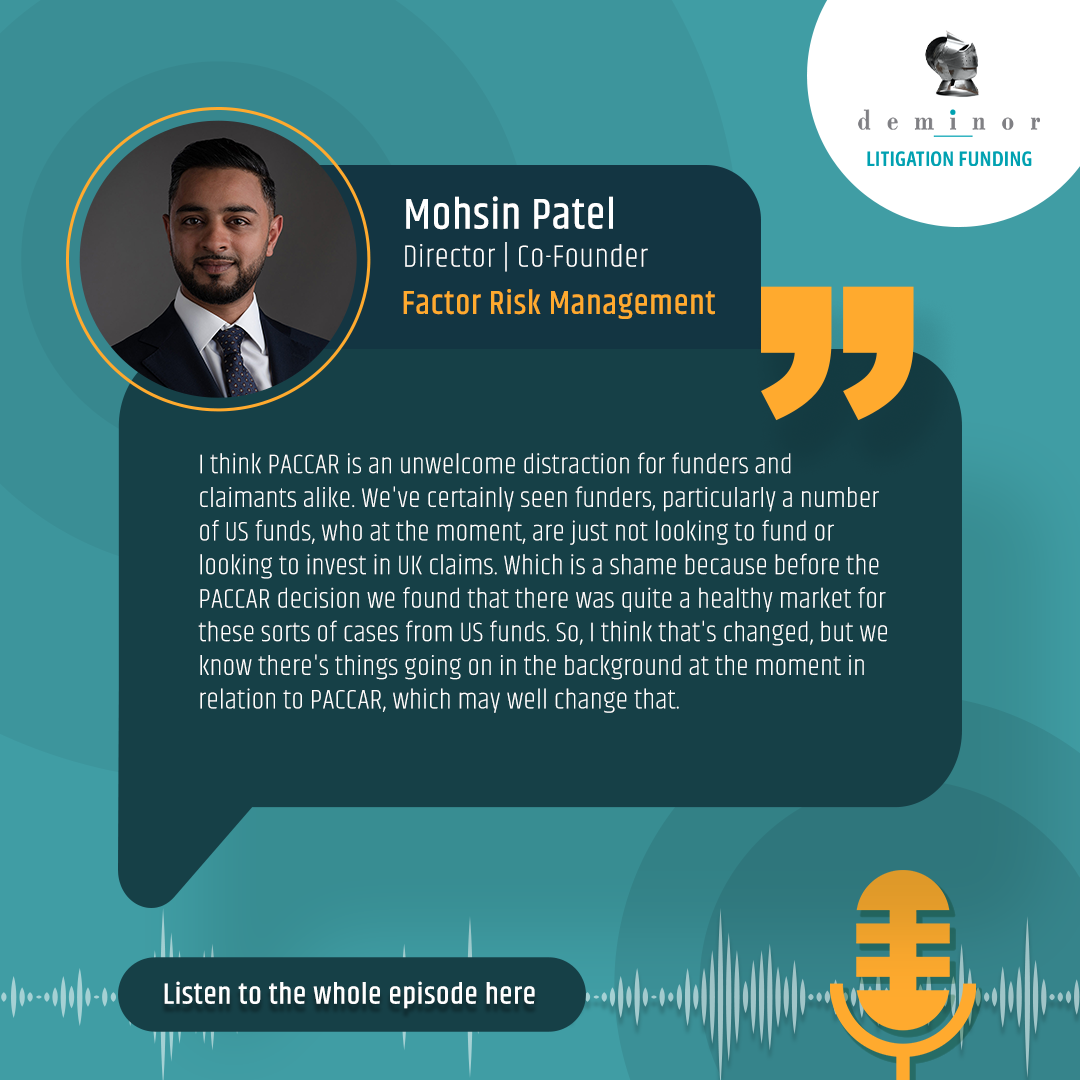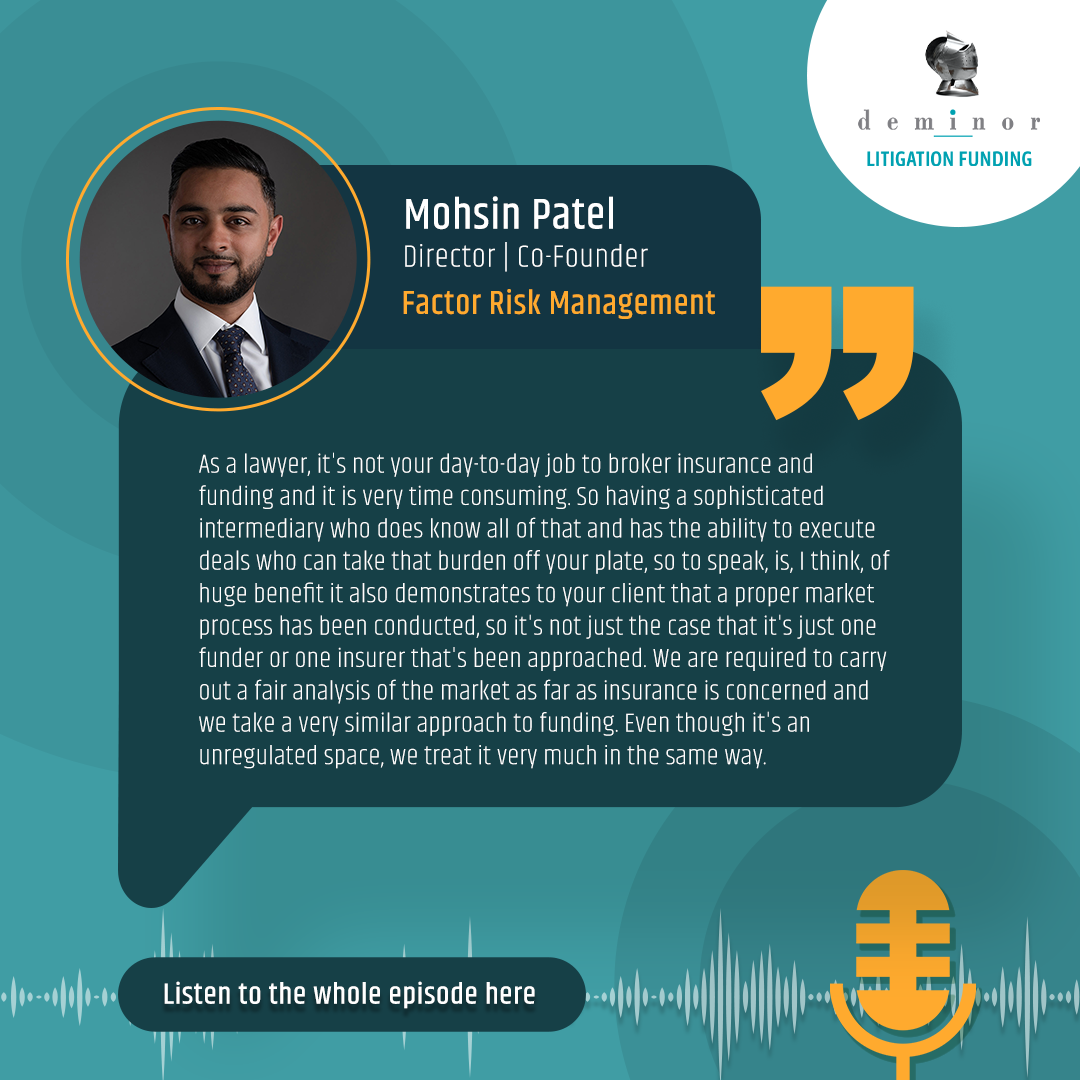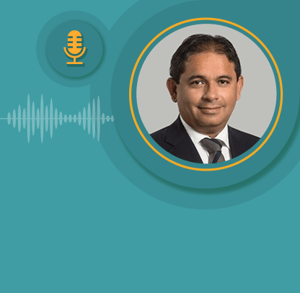In this podcast series, Emily O'Neill General Counsel UK for Deminor Litigation Funding, undertakes interviews with global professionals to discuss different aspects of the litigation funding process. We have already considered the importance of the client in litigation funding as well as the business case for funding.
Deminor welcomes you to join this conversation as we summarise the key elements of the conversations between Emily O'Neill and these experts, as captured in the podcast transcripts below.
Podcast Preface:
Deminor General Counsel UK, Emily O'Neill (EON), speaks with Mohsin Patel (MP), Co-Founder and Director at Factor Risk Management, who is a Specialist in Litigation finance and Dispute Insurance.
In this interview with Emily, Mohsin considers the litigation funding market, the options available for funding litigation and discusses the litigation insurance market the litigation insurance market.
Podcast Transcript:
EON – What do law firms and claimants need to know about the litigation funding market in 2023?
MP – The litigation funding market has expanded in various ways over the years, and there are different types of funders looking at different types of cases. You have everything from the large investment funds or hedge funds, multi-strategy funds that have a certain allocation to litigation finance claims. You have private family offices who have put together a strategy to fund litigation. Then you have the listed funds as well, the likes of the Burfords and the Omnis, et cetera. And then you have a lot of other platform funds, the likes of Deminor, the likes of Harbour and so on and so forth. So, you have a number of different types of structures that exist out there which have their own appetite.
In terms of types of cases, some are focused on pure vanilla commercial litigation, others focus more on collective actions. There are others that only want to look at secondary market transactions. And there's some others that will look only at things like judgement enforcement or asset enforcement type claims. So, in terms of the types and sizes of cases you have some funds that will look at claims worth hundreds of millions, and there's other funders that will be happy to look at claims worth as low as five or 10 million.
There's an entire spectrum of litigation funders out there that exist in the market. And for any given type or size of case, the geographical location, jurisdiction, assuming the case is meritorious, and it meets all the other relevant factors i.e., there's a path to enforcement recoverability, the legal merits are sound, and the budget is proportionate to the amount of damages at stake… we can usually find a home for it.
EON – Following PACCAR, there's been some change in the UK market. Can you comment on how you’ve seen the market change? Are there different levels of interest from different funds or different case types becoming prevalent in the market?
MP – I think PACCAR is an unwelcome distraction for funders and claimants alike. We've certainly seen funders, particularly a number of US funds, who at the moment, are just not looking to fund or looking to invest in UK claims. Which is a shame because before the PACCAR decision we found that there was quite a healthy market for these sorts of cases from US funds. So, I think that's changed, but we know there's things going on in the background at the moment in relation to PACCAR, which may well change that.
But certainly, there's a degree of reticence from US funds and just generally litigation funds at the moment are looking quite carefully at their books, looking at their existing exposure and considering whether or not they want to really be funding certain types of claims. I think competition claims at the moment people are thinking quite carefully about, but on the whole, for good cases, there is still a healthy market of funders out there willing to invest in those cases. But for sure PACCAR has added an uncertainty that was pretty unwelcome and needs to be resolved.
EON – Agreed. I think some claim types like the competition claims, are more difficult to restructure as a multiple rather than referring to the benefit obtained by the claimant. So, I think we'll see continued caution until a time when the government takes some steps to clarify what's happening in the law at the moment.
EON – How is the insurance market responding to mitigate risk in disputes?
MP – ATE insurance (after the event insurance) – I think most claimant litigators and funders will be familiar with, exists to protect a claimant from the risk of having to pay opponents costs in the event of a loss. ATE as a product has expanded over time to, for example, include things like disbursements and also to include own costs. So, there are numerous insurers now who are willing to consider not just covering opponents’ costs in the event of a loss, but also the claimant's own legal fees. What that means is law firms can be more creative about the types of structures that they offer their clients when they can say, for example, ‘we will be willing to act on a partial CFA’. Whilst usually the CFA amount would be fully on risk for the law firm, which could be a bit of a cause for concern for them if the case goes particularly long, they can now, as a firm, hedge that risk or a proportion of that risk. And similarly, as a claimant, there's all sorts of instances where funding isn't suitable for a case quite often if it's not economically viable, if it doesn't sustain a typical funder's return. And in those scenarios a client can say well look, we will fund the case with our own money without using our own cash flow, but we still would like to have some degree of downside protection. So having own costs insurance to protect against a loss I think is something that we're seeing an increased in demand for.
After the Event insurance as a product has expanded out to include own disbursements and own costs. Anti-avoidance endorsements or deeds of indemnities are frequently deployed now in cases where security for costs is likely to be an issue. We see that not just in commercial litigation but also increasingly in arbitration now where respondents are more willing to make security applications.
Aside from after the event insurance, there's a number of other products out there that we're seeing an increased taken up on, for example, cross undertakings in damages insurance. This is where in scenarios where a freezing injunction is going to be obtained or going to be sought and as part of that application a cross undertaking is required. Now, that cross undertaking could theoretically be a significant risk to the applicant and a way to try and manage that risk would be to obtain a cross undertaking and damages insurance policy. So, in the event that the cross undertaking is called upon, the policy is there to provide some protection to the applicant.
Another product that we're seeing increasing use of is judgement preservation insurance. This is really a contingent legal risk market product. This operates simply where you have a judgement, or a first instance award and you'd like to protect against the risk of that being overturned. There is a healthy insurance market out there that will provide cover for a significant proportion of those damages. I think that's something that we've seen a lot of use of in the States. There's been less use of it in the UK, but I think that's mainly down to a lack of education and also the markets that exist haven't spent a huge amount of time in the UK market, but I think they're now more willing to do so.
I think those are some of the products that we see. And of course, capital protection insurance, which is similar to own costs, but it really operates for litigation funders in the main, or investors who are investing in litigation funds at a fund level or indeed on an individual case or on a portfolio basis. Capital protection effectively means what it says on the tin: It provides you with the investor with downside protection in the event that the capital is lost for a particular investment in a case or in a portfolio or in a fund. So, I think there's a healthy market at the moment for insurance products in litigation finance and hopefully that will remain.
EON – What do law firms and claimants need to present to insurers to get a quick offer of cover?
MP – So the same things that they would provide a funder typically. There will usually need to be some sort of assessment on the legal merits of the case, whether that's done by an independent barrister or whether it's done by the law firm. Setting out what the facts of the case are, the various causes of action, what damage is likely to be. So, I think a legal assessment is quite an important part of the puzzle. If there's going to be any expert evidence or any other factual evidence that's going to be needed, quite often that's not done very early in the case, which is understandable, but to the extent that it exists, I think that's pretty important, and having an understanding of what the likely damages and cost position is going to be. So the ratio that funders typically look for, that 10:1 damages to cost, is more like 2:1 where insurers are concerned. But they would still want to know that there is enough fat in there for the claimant to walk away with a healthy amount and for the insurer to make their deferred and contingent premium.
And finally, this is something funders spend a lot of time focusing on, insurers less so to a degree, but there will still need to be some assessment of the creditworthiness of the opponent to ensure that in the event of a win, a recovery is going to be possible.
EON – What's the benefit of using a broker to source insurance or funding rather than going direct?
MP – I think the number one benefit is just ease. To approach multiple markets firstly to understand who the appropriate markets are in the insurance field or in the funding field, understanding their respective appetites, their internal processes, I think is a challenge for anyone. Even an experienced litigator or claimant that has knowledge of the funding space or the insurance space and has done deals before. As a lawyer, it's not your day-to-day job to broker insurance and funding and it is very time consuming. So having a sophisticated intermediary who does know all of that and has the ability to execute deals who can take that burden off your plate, so to speak, is, I think, of huge benefit it also demonstrates to your client that a proper market process has been conducted, so it's not just the case that it's just one funder or one insurer that's been approached. We are required to carry out a fair analysis of the market as far as insurance is concerned and we take a very similar approach to funding. Even though it's an unregulated space, we treat it very much in the same way.
And then, of course, once you can convince a funder or an insurer to invest or insure a case, it's assisting with the contractual process, assisting the lawyers and the claimants with guidance on what is market and what is not, what is acceptable and what is not, finding ways to overcome the inevitable obstacles that happen when you are trying to close a deal, and the kind of transactional angst that occurs.
I think a good advisor, a good broker, will be able to help cut through the issues and ultimately get the deal to execution, which is the name of the game. Given that less than 5% of all cases that a funder receives are successfully funded, being able to get to the nub of the issue and understand a funder's appetite and then drive the deal to execution, I think is of huge benefit to lawyers and their clients.
And then finally, once a deal is actually secured and contracts assigned, staying as a point of contact throughout the lifetime of the case to deal with those inevitable issues that occur, whether it's budget variations or applications being made which no one had anticipated, et cetera. As ultimately, law firms have a duty towards their client, funders have duties to their investors. Whilst everyone is aligned in the sense of trying to get a successful outcome, they do have their own respective duties and they are duty bound to look after them.
So, it's our job to keep everyone honest and make sure that everyone behaves in a way that's conducive to a long-term relationship. Because even with the best will in the world, most litigation takes several years, so it's important that that relationship is maintained properly.
Litigation Funding Podcast Series - Next Steps and Further Information:
Thanks for joining Deminor's Litigation Funding Podcast Series as we dive deep into core topics in funding litigation.
Keep a lookout for our upcoming conversations as Deminor General Counsel UK, Emily O'Neill, speaks with several more experts to get their insights into different aspects of litigation funding.
If you would like to connect with either Emily or Mohsin on LinkedIn, please click on the links below:
Emily O'Neill – Deminor General Counsel UK and Global IP lead
Mohsin Patel - Factor Risk Management Co-founder and Director
***
Further Reading:
- https://www.deminor.com/en/case-studies/co-funder-proposes-sharing-of-litigation-funding-risk-to-leverage-deminors-in-house-due-diligence-capability
- https://www.deminor.com/en/case-studies/financing-assertion-of-patents-protecting-manufacturing-processes
- https://www.deminor.com/en/case-studies/telecoms-patent-assertion-multi-jurisdictional-campaigns
- https://www.deminor.com/en/case-studies/canadian-innovative-start-up-preparing-for-a-david-v-goliath-litigation-funding-battle
- https://www.deminor.com/en/case-studies/whats-the-risk-assessing-the-risk-of-counter-assertion-by-the-defendant-in-patent-litigation
- https://www.deminor.com/en/case-studies/overstepping-the-mark-litigation-funding-trade-mark-infringement
- https://www.deminor.com/en/case-studies/lights-camera-action-recovering-damages-for-infringement-of-rights-in-a-short-film
- https://www.deminor.com/en/case-studies/recovering-damages-for-stolen-software-through-litigation-funding
- https://www.deminor.com/en/case-studies/funding-in-the-pharma-sector-/-investing-in-a-case-where-litigation-is-already-ongoing


